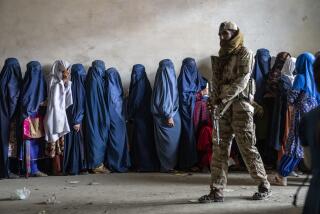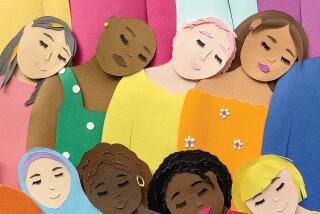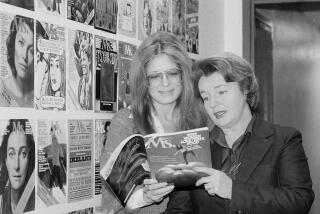Women Have a United Notion for Forum ’85
- Share via
NEW YORK — “When we look at Copenhagen and Mexico City,” Suzanne Elson said here Tuesday, “we feel a great sense of pain and loss.”
Conflict and what Elson, a member of the American Jewish Committee’s delegation to next month’s Forum ’85 Decade of Women conference in Nairobi, termed “destructive rhetoric” marred those first two conferences of the United Nations Decade of Women, held in 1980 and 1975, respectively. Divisiveness overshadowed many of the issues, and polarization--particularly between Arab women and Jewish women--opened the way for charges of political manipulation at the expense of substantive discussion.
A New Determination
The legacy has left many of those preparing for the July conference determined to avoid a repeat performance.
“Women have begun to see they may not be used for each others’ political purposes,” Dame Nita Barrow declared, “and they realize they can get together to discuss their own issues and solve their own problems.”
Barrow, president of the World Council of Churches and the International Council for Adult Education, a former president of the World YWCA and the principal nursing officer of Jamaica, will convene Forum ‘85, the July 10-19 meeting of non-governmental organizations and individuals that will partially overlap the United Nations-sponsored governmental conference marking the end of the U.N. Decade of Women. The U.N. conference will take place in Nairobi July 15-26. Along with Elson and several other Forum ’85 delegates, Barrow called a press conference here to address the polarization issue and to discuss objectives of this last gathering of the United Nations Decade of Women.
‘Principal Actresses’
As many as 9,000 to 10,000 women from upwards of 160 nations are expected to attend the Forum ’85 meeting, Barrow said, stressing that “quite often people do not seem to be clear about the NGO (non-governmental organization) forum and the official government meeting.” The latter gathering, Barrow explained, will see government-appointed delegations and “women who are members of government organizations” as “the principal actresses.” By contrast, Forum ‘85, in the tradition of earlier NGO women’s decade gatherings, is “an open meeting,” with unrestricted access to individuals or organizations from around the world. Funding is provided by sponsoring organizations, private individuals and special grants.
In addition, Barrow went on, whereas the official U.N. meeting will publish numerous reports, records and recommendations, “the forum brings out no official documents--no resolutions, no statements.
“How can you?” Barrow asked, “when you are representing that large a body of women.”
Nonetheless, she contends, “this kind of meeting has its benefits, in that it allows free exchange of opinions--listening as well as talking.” Its objective, Barrow said, is “to provide a space so people can dialogue with each other and learn from each other.”
In large part to avoid the stridence that has characterized the earlier meetings, “we will have no structured agenda,” Barrow said. Rather, “you create a climate, and you leave it open. You create a space where people can meet, and from there it’s up to the delegates in each workshop to decide what exactly they want to discuss.
“But every delegate has agreed to a social contract, which says that if (political) conflict appears in a meeting, the meeting must stop. Furthermore, we have created areas where people who differ can, if they wish, get together to discuss their differences rather than disrupt an entire meeting.”
Profiting From Conflict
Such conflict resolution centers, said another Forum ’85 delegate, the Rev. Joan Brown Campbell of Cleveland, will be staffed by “people who are experts in conflict resolution,” and will aim not merely to assuage conflict, but to profit from it.
“It is not that we are so naive as to believe there will be no conflict,” Campbell said. “That is in part how people learn. It’s how the conflict is dealt with that’s critical.”
“We hope they will disagree in a manner that allows discussion,” Barrow said, “not closed doors.
“It may be a very big dream to hope for that,” she said, “but we have a lot of trust in women. Nothing will be gained if we all go home in a rage.”
“Our strategy is an open one,” Elson of Atlanta agreed. “We are going in with a positive attitude and with open minds, and we are looking beyond the pitfalls of the past.”
Affecting All Women
For one thing, Barrow said, “women now realize that if they look at some of the issues we are concerned with--such as health, development, peace, education, employment and equality--they see that these issues affect all women, and we need to discuss how we are affected by them, not argue about them.”
“Days and days” of workshops will focus on these areas, plus such issues as the problems of children, older women, refugees and migrants and “women in emergency and crisis situations,” Barrow said. “It is hoped,” she added, “that women will . . . review the past, but not spend too much time on it. We are looking to the future, because we have asked that there be a focus on strategies that will carry women forward.”
This emphasis “is in focus with the spirit of the United Nations conference,” Barrow said. “It’s very easy to spend our time breast-beating, but it’s much more important to spend time on action: What are we doing? And how can we do it?”
Common Experiences
In a further effort to downplay differences--and hence, it is hoped, reduce possible strife and polarization--Barrow said common experiences will be emphasized. “Whether women want to acknowledge it or not,” she said, “all women everywhere suffer from some form of discrimination or oppression.”
Similarly, “there is no cause for us to talk about developing countries versus developed countries. The terms are misnomers, because every country has its developing world--every country, including this one, has its underprivileged, every country its affluent. This is something that all women know very well.”
Nevertheless, Campbell, for one, criticized the official U.S. delegation to the United Nations Nairobi conference because “women of limited economic circumstances” have not been included in it. Canada, on the other hand, “will bring welfare mothers,” Campbell said. “This is still a challenge to all of us from the United States. Women from the entire economic spectrum need to be represented.”
Avoiding Mere Rhetoric
Barrow said she was confident that the two back-to-back meetings could avoid degenerating into mere rhetoric. “When you have women talking about what they are doing, it is not rhetoric,” she said.
But as for executing actual policy changes, Barrow smiled: “Ah, yes. We can do it. We can do anything if we set our minds to it.”
In a pre-conference questionnaire, Barrow said, “women around the world have said there are not enough women at policy-making levels. That can be changed.”
Translating the discussion from these two major gatherings into action is the challenge, Barrow said, especially “in a world run by men.” She laughed. “Now that is what women have to change.”
More to Read
Sign up for Essential California
The most important California stories and recommendations in your inbox every morning.
You may occasionally receive promotional content from the Los Angeles Times.












